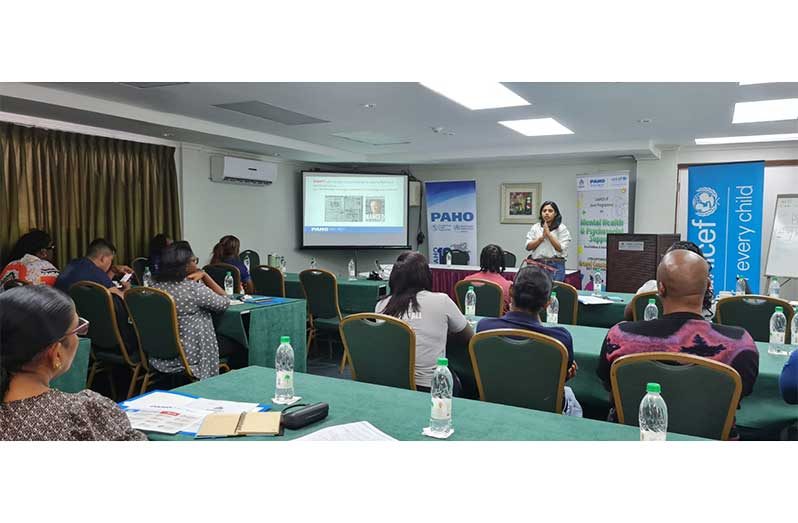MENTAL health care in Guyana is on the brink of transformation, spearheaded by the Ministry of Health’s ambitious, wide-ranging initiatives designed to decentralise and improve mental health support.
Over the last weekend, a workshop at Cara Lodge marked a significant step forward as journalists across the country received training on sensitive reporting about mental health and suicide from the Ministry of Health and the Pan-American Health Organization (PAHO). The training highlighted the critical role of the media in fostering understanding, reducing stigma, and informing the public responsibly on mental health issues.

At the forefront of this movement, Dr. Timothy Morgan, Director of the Mental Health Unit, outlined a vision for mental health care embedded within Guyana’s health sector growth. “Each of the new hospitals will be equipped to address mental health cases, integrating mental health into the healthcare infrastructure,” Dr. Morgan stated, emphasising a community-based approach. By tailoring mental health services to the distinct social and economic needs of each region, the Ministry aims to dismantle the stigma surrounding mental health issues and foster accessible, region-specific support systems.
A 3-digit suicide helpline is set to be reinstated soon, offering a lifeline for individuals in need of immediate assistance. “Our focus is on a holistic, region-specific strategy,” Dr. Morgan explained and added that “Mental health is not just about treating symptoms; it’s about addressing root causes, from economic pressures to social isolation. We’re partnering across sectors—from the Ministry of Health to economic and social groups—to ensure mental health care is a collaborative national effort.”
This emphasis on inclusivity is seen in the Ministry’s pioneering Mobile Psychiatry Clinics, which have enabled access to mental health care in remote communities that previously faced barriers due to geography and financial constraints. “These mobile clinics have been a game-changer,” Dr. Morgan shared, noting the dramatic decrease in long-term psychiatric hospital admissions. “We’re bringing support directly to those who would otherwise go without care, ensuring that no one is left behind.”
The Ministry’s decentralisation efforts also extend to Guyana’s hinterland regions, where they are establishing systems that allow residents to receive care close to home. “Moving mental health services from central hospitals to community-based care is key,” Dr. Morgan said. “This shift fosters a supportive environment where individuals can receive mental health care in a setting that’s familiar and welcoming.”
Significant strides have also been made through landmark legislation, including the Suicide Prevention Act and the Mental Health Protection and Promotion Act, passed in 2022. These laws provide a humanistic, rights-centred framework for mental health care in Guyana, setting a standard for neighbouring Caribbean countries also considering mental health policy reforms.
“The main goal,” Dr. Morgan emphasised, “is to make mental health care accessible to every Guyanese, regardless of location. People should not have to travel miles for this care. Our plan is to ensure they can receive treatment within their own communities.”
Looking ahead, the Ministry’s Mental Health Action Plan 2024-2030 charts an expansive course for continued improvements. “Mental health is everyone’s concern,” Dr. Morgan affirmed. “We’re committed to a whole-of-government, whole-of-society approach that includes partnerships with ministries, NGOs, and the private sector to create lasting change.”
With a mission anchored in accessibility, collaboration, and compassionate care, the Ministry of Health’s current initiatives signal a new era for mental health in Guyana. Through these developments, the government is laying the foundation for a mental health system that meets the needs of all citizens, reinforcing the belief that mental health care is not just a luxury, but a fundamental right for everyone.



.jpg)








